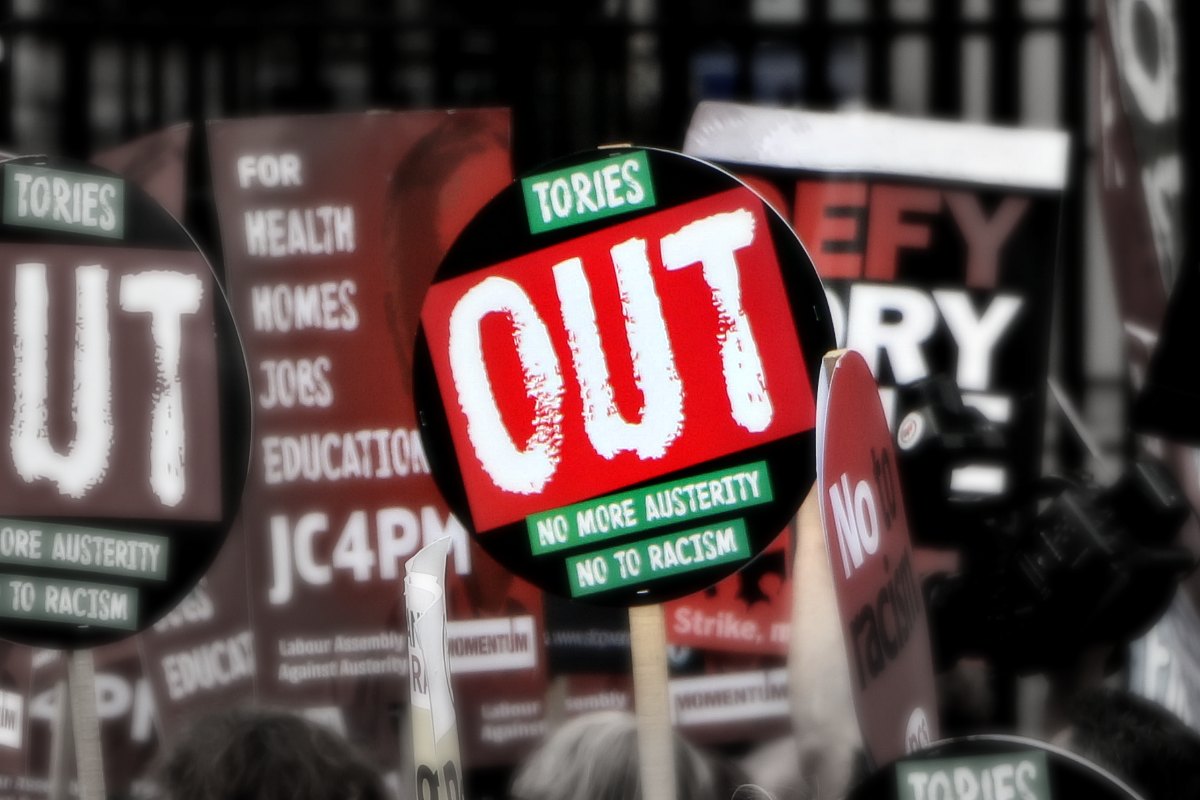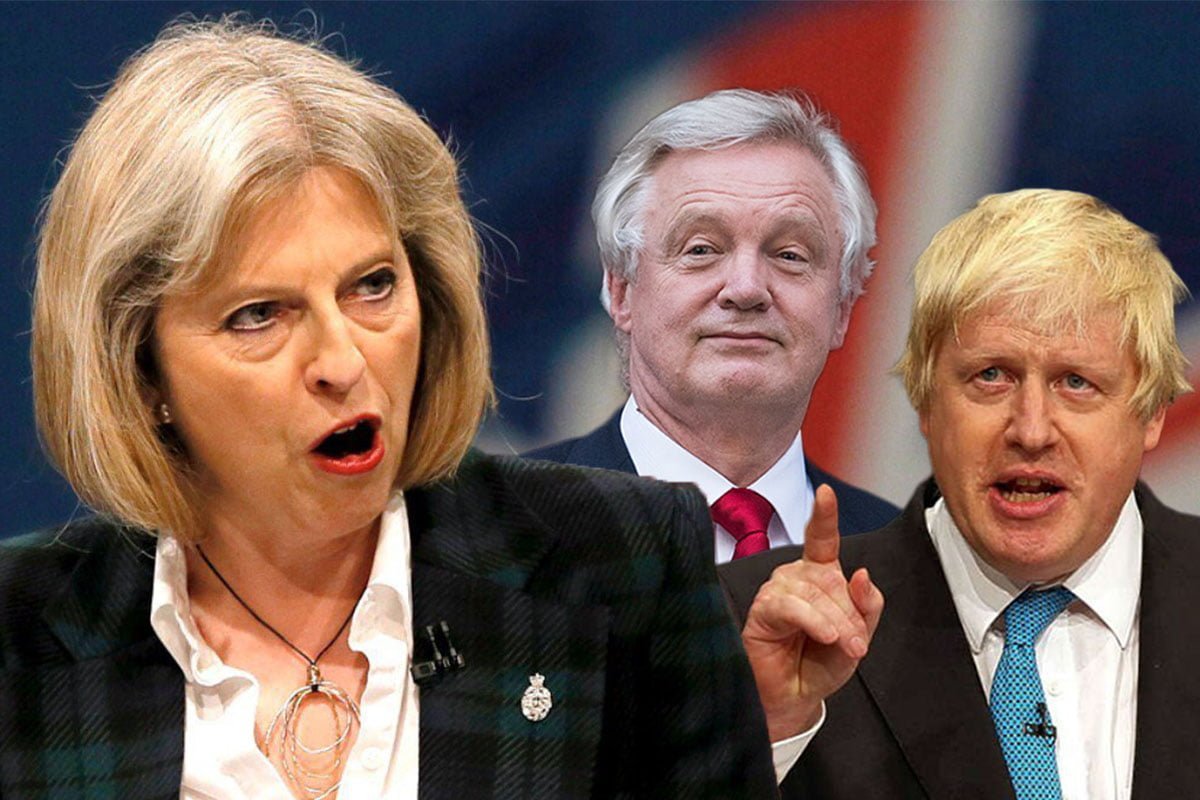The resignation of Brexit-supporting ministers David Davis and Boris Johnson has left Theresa May hanging by a thread. Only the threat of a Corbyn government now keeps the Tory Prime Minister in power.
Less than three weeks after she survived an ultimately toothless rebellion by her pro-European MPs, Theresa May has embarked on a collision course with the hard-Brexit-wing of her party, provoking the deepest crisis her government has faced since last year’s general election.
Although she succeeded in gaining a short-lived cabinet consensus on Friday (6th July) for the government’s softest Brexit plan to date, the resignations of Brexit secretary David Davis and foreign secretary Boris Johnson have dealt a heavy blow to May’s authority amongst Tory Brexiteers. The stage is now set for what may prove a decisive showdown – one that could lead to a fresh general election.
Brexit softens
 The plan itself, described as a “turd” by the now-former-foreign secretary Boris Johnson, was the inevitable product of pressure from big business, which has been building ever since the vote to leave in 2016.
The plan itself, described as a “turd” by the now-former-foreign secretary Boris Johnson, was the inevitable product of pressure from big business, which has been building ever since the vote to leave in 2016.
This burst into the open with the recent declarations from a number of major manufacturers, such as BMW and Airbus (which employ around 14,000 people in the UK), who announced that they would move their operations out of the UK unless they were given much greater “clarity” on the terms of Brexit.
In the run up to the cabinet’s Brexit summit a number of important firms and CEOs had come out more clearly than ever, stressing the risks a “no-deal Brexit” would pose for British capitalism. This follows a stark warning from the head of the CBI that parts of the UK manufacturing sector could even become “extinct”.
These concerns are clearly reflected in the cabinet statement, agreed last Friday. The most significant feature of this statement is that it calls for a “free trade area for goods” that seeks an “ongoing harmonisation with EU rules on goods”. This means UK manufacturing and agriculture will continue to be bound by EU regulations, customs rules and even rulings of the European Court of Justice post-Brexit. This marks a huge concession.
Further, if it were accepted by the EU, this proposal would almost certainly restrict the UK’s ability to conclude free trade agreements with countries outside of the EU, such as the USA for example – a red line for Tory Brexiteers.
In one form or another, this position – labelled “Brexit in name only” (or “BRINO”) by hardline Brexiteers – has always been the preferred option for British business, short of abandoning Brexit altogether, something which Theresa May will have felt keenly ever since she took the reins.
It should therefore come as no surprise that, despite all her bluster about “global Britain”, May is attempting to pursue an increasingly ‘soft’ Brexit. Indeed, it is likely to get softer still when the EU demands even greater concessions, as Davis himself warned in his letter of resignation.
What is more surprising however is the fact that some of the self-appointed champions of Brexit, such as Michael Gove and Liam Fox, have chosen to attempt to polish the aforementioned “turd” instead of joining Davis and Johnson in resignation.
In truth their apparent paralysis reflects the agonising impasse that grips the Tory Party today. Trapped between the hardline Tory rank-and-file and the ruling class – in whose interests they must ultimately govern – leading Brexiteers now face their own dilemma.
For now, Gove appears to have taken up the role of ‘Turd Polisher In Chief’. But Davis’ resignation, which was followed hours later by that of Johnson, may have set in train events that are out of anyone’s control.
Outrage
 With such a clear move towards a soft Brexit, May has thrown down the gauntlet for the large and influential hard-Brexit wing of her party. She would have hoped that by forcing a retreat from leading Brexiteers in the cabinet, she will leave her hardline opponents leaderless and without direction. But Davis’ and Johnson’s resignations have called this into question.
With such a clear move towards a soft Brexit, May has thrown down the gauntlet for the large and influential hard-Brexit wing of her party. She would have hoped that by forcing a retreat from leading Brexiteers in the cabinet, she will leave her hardline opponents leaderless and without direction. But Davis’ and Johnson’s resignations have called this into question.
It is not for nothing that some commentators have described May’s decision to challenge her hard Brexit ministers as “the second biggest gamble of her career”, after her ill-fated snap general election last year. Her attempt to unify her cabinet around a plan that is amenable to the interests of British capitalism may bring the split in her party beyond the point of no return.
The message from Davis was clear: “No further”. In his resignation letter he pulled no punches, stating that “the general direction of policy will leave us in at best a weak negotiating position, and possibly an inescapable one”; and “the inevitable consequence of the proposed policies will be to make the supposed control by Parliament illusory rather than real”. This is an unequivocal rejection of the Prime Minister’s entire policy, which could alone be enough to cause Tory Brexiteers to “cry havoc and let slip the dogs of war”.
A number of Tory MPs have already begun to mobilise and are rumoured to be circulating a draft statement, condemning the Prime Minister’s position as “complete capitulation” and calling for a “new leader”.
Under Tory Party rules, only 48 MPs are needed to trigger a vote of no confidence. And with so many Tory MPs seeking a hard Brexit, it is certainly possible that such a target could be reached. What is less clear however is whether May’s opponents would be able to win the 159 votes (out of 316 Tory MPs) required to oust her and begin a new leadership contest.
The outrage provoked by the the “Chequers statement” in the ranks of the Tory Party should not be underestimated. During the debate in Parliament that followed the publication of the statement, several Tory MPs reported that they had received hundreds of emails from people who were “dismayed” by May’s “sell-out” and felt “betrayed” by her leadership. One MP, Peter Bone, reported that his local activists had even refused to campaign for the party the day after the statement was published.
May has been quick to stress the need for party unity, warning her critics that if they did not rally behind her, the outcome would likely be a Corbyn government. For now it seems this threat may be just enough to hold the Tory Party together. But at a certain stage the wave of revulsion sweeping through the Tory Party membership could carry the party into a disastrous leadership contest as party members pile more and more pressure on their representatives.
No way out
 But even if the threat of a Corbyn government is enough to keep the Tory Brexiteers in line, this will by no means be the last crisis this government will face, nor the most important. Keeping the Tory civil war within the bounds of order is one thing, but May’s fragile peace could be shattered in an instant should the EU refuse to play along.
But even if the threat of a Corbyn government is enough to keep the Tory Brexiteers in line, this will by no means be the last crisis this government will face, nor the most important. Keeping the Tory civil war within the bounds of order is one thing, but May’s fragile peace could be shattered in an instant should the EU refuse to play along.
As has already been stated by commentators on both sides of negotiations, large parts of the government’s proposal remain impossibly vague, with one EU official calling it “a lot of fudge with a cherry on top”.
The most important area of uncertainty still rests on the Irish border, which represents a red line for both the UK and EU negotiators. The latest proposal is a “facilitated customs arrangement”, which is almost identical in substance to the government previously preferred option of a “customs partnership”, already dismissed as “magical thinking” by the EU in March. Unfortunately, this is unlikely to win much support in Brussels, with one EU official already calling it “the fudge of the century”.
Then there is the small matter of the single market. The EU has been consistently clear that it will not accept any deal that threatens the “integrity of the single market”, which requires the indivisibility of the so-called “four freedoms”: the free movement of goods, capital, services and labour.
The government’s current plan, although its softest yet, still proposes to limit the movement of labour and provide “flexibility” on the movement of capital and services, whilst retaining full access to the single market for goods and services at least. The EU’s response so far will not have given May any reassurances, with one negotiator saying simply, “No way, no way, no way.”
May could quite easily find herself being sent back to square one, having staked whatever was left of her shattered authority on forcing her hard Brexit MPs to accept an unworkable compromise. If this should occur, it will not be long before the government faces yet another rebellion, either from its pro-EU or hard Brexit wings.
Downfall
 Throughout all the twists and turns of the UK’s tortuous negotiations with the EU, two things have been constant and unwavering: the bitter split in the Tory Party, and the impossibility of leaving the EU without provoking a crisis for British capitalism. These two great millstones have hung around Theresa May’s neck since she slunk into power two years ago. And, sooner or later, their weight will break the back of her government.
Throughout all the twists and turns of the UK’s tortuous negotiations with the EU, two things have been constant and unwavering: the bitter split in the Tory Party, and the impossibility of leaving the EU without provoking a crisis for British capitalism. These two great millstones have hung around Theresa May’s neck since she slunk into power two years ago. And, sooner or later, their weight will break the back of her government.
No amount of parliamentary maneuvering can avoid the bitter reckoning which is to come inside the Tory Party. Every concession to the EU will push more Tory MPs towards the rebel camp, while every fudge simply piles up the contradictions for a later date.
Even if the Tories hang together long enough to carry through Brexit in one form or another on 29 March 2019 – which cannot be ruled out – this would be at the cost of unleashing an even deeper crisis further down the line. Whenever it comes, this inevitable crisis will shake British politics and British society to its foundations.
Only a real alternative to the crisis of capitalism can offer any hope for workers and youth. As the government faces a showdown with its own party, the labour movement should prepare for a fight of its own: the fight to hurl the Tories out of power, put Corbyn in No. 10, and take the economy out of the hands of the bosses and speculators who profit daily from our suffering.
Kick out the crisis-ridden Tories! Fight for a socialist Labour government!






